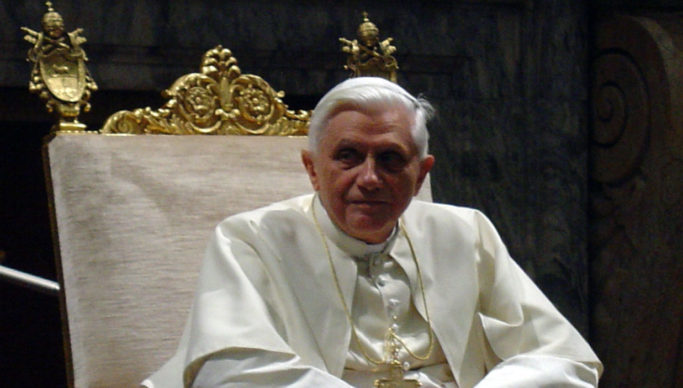
Reflections on Holy Saturday by Pope Benedict
- By WRN Editorial Staff --
- 22 Apr 2023 --
Holy Saturday, which commemorates the time when Jesus Christ was buried on the eve of his resurrection on Easter Sunday, is an occasion of “divine darkness” that speaks to our conscience and calls into question the foundations of Christianity, the late Pope Benedict once said.
“On Good Friday we still had the crucified man to look at,” wrote Cardinal Joseph Ratzinger, as Benedict was known before he became pope, in a March 2006 article titled “Three Meditations on Holy Saturday: The Anguish of an Absence.”
“Holy Saturday is empty, the heavy stone of the new tomb is covering the dead man, it’s all over, the faith seems to have been definitively unmasked as fantasy,” Benedict said in the article, which was published a year after he became the head of the Roman Catholic Church.
His point: “No God saved this Jesus who posed as his Son.” And yet it is precisely with Jesus’s crucifixion that the Almighty expresses his solidarity with humans. “The most obscure mystery of the faith is, at the same time, the clearest sign of a hope without end,” the pope wrote.
“And what is more: only through the failure of Holy Friday, only through the silence of death of Holy Saturday, were the disciples able to be led to an understanding of all that Jesus truly was and all that his message truly meant,” wrote Benedict. “God had to die for them so that he could truly live in them.”
Benedict referred to the famous 1882 declaration by the German philosopher Friedrich Nietzsche: “God is dead! And we have killed him!” As humans “encourage each other to start preparing to take God’s place,” wrote Benedict, the “terrible mystery of Holy Saturday, its abyss of silence, has thus acquired a crushing reality in these days of ours.”
Unbeknownst to much of the world, the idea that God is dead “is taken almost literally from Christian tradition,” the pope wrote in his article. But we have also “killed him, by enclosing him in the stale shell of routine thinking, by exiling him in a form of pity with no content of reality, lost in the gyre of devotional phrases or of archaeological treasuries; we killed him through the ambiguity of our lives, which also laid a veil of darkness over him.”
Holy Saturday, by far the most uncelebrated day of the Holy Week, was particularly significant to Benedict, who was born and baptized on that very day in 1927. In a 2006 book, titled The Sabbath of History, which he coauthored with an abstract impressionist painter and convert to Catholicism named William Congdon, the pope urged believers to appeal to God thus:
“Wake up, don’t let the darkness of Holy Saturday be endless, let a gleam of Easter also fall in our days … don’t let us sink into darkness; don’t let thy word be drowned in the banter of these days. Lord, help us, for without thee we would perish. Amen.”


















